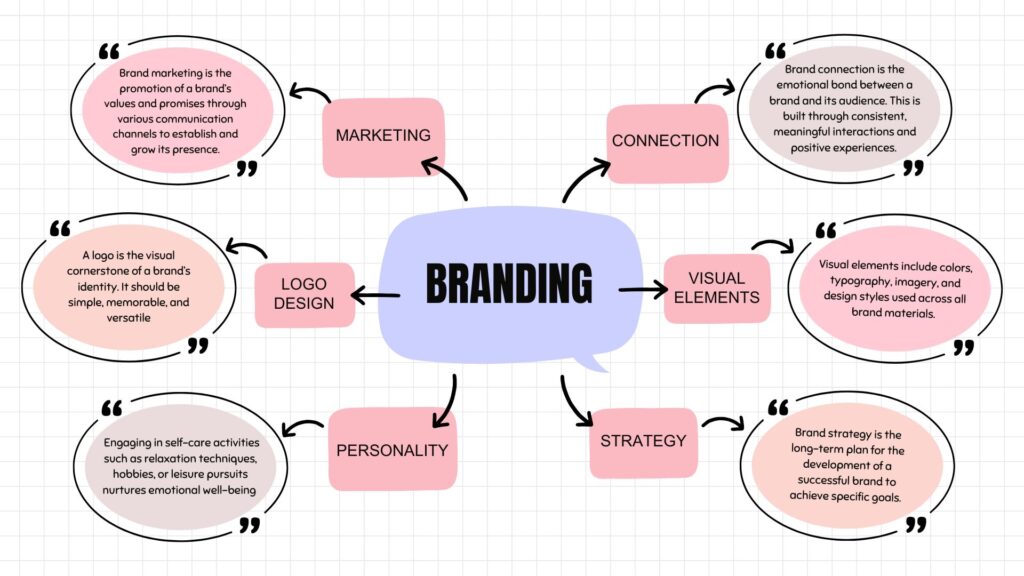As marketplaces are getting more saturated and competitive than ever, branding concepts are becoming more popular. Owners have to work on the strategies and inner policies behind their business to work things out. If you are also into learning these things clearly, no worries! We’ll be clearing all the details about branding concepts.
Before stepping on the branding concept, let me clear on what a brand is! For mass people, there is a common misconception about brands that a brand is about a logo or selling some goods. Whereas a brand is more than just a logo, a name or just products—it’s the overall identity of a company, product or individuals, the emotional and psychological relationship it has with its audience. A brand represents the way people perceive and connect with that organization.

In short, a brand is the sum of all experiences, perceptions, and interactions that a person has with your company, product or individual and how they perceive your business.
What is Branding?
Branding is the process of telling the unique story of your brand to your audience. It’s the connection between the visual identities and the marketing process of your brand who speaks about your business, products, values and perceptions.It involves a combination of elements such as a name, logo, tagline, design, and messaging, all crafted to communicate the essence, values, and personality of the entity. The goal is to shape perceptions, build recognition, foster trust, and differentiate from competitors.
Branding extends beyond visuals—it includes customer experience, reputation, and the emotional connection people develop with the brand. Strong branding helps create loyalty, attract customers, and convey credibility. It is essential in defining how an entity is perceived and how it wants to be seen.

Can you compare a renowned brand with a local business? Where is the difference actually! The secret lies in the branding sauce. Local businesses don’t follow the branding procedures, they don’t target the large community to serve. But Brands can exist everywhere, in all the countries. All the big brands have branches in many countries. For example – Nike, Apple, McDonalds, Pizza Hut etc. People Love to experience the brands beyond the high prices.
As a business owner, It’s up to you how you want your audience to pursue your brand and how you are going to create your story by proper visual aesthetics, print materials, advertisement, strategies and online and offline marketing. What perception you want to spread to your audience.
Owners have to sell their story way before they can sell their products. Otherwise in the most saturated and competitive era it’s not possible to grow. The brand’s success depends on telling the story in a very organized way from every way possible. So that audience can have a clear concept about the brand. When branding is done successfully, the audience begins to recognize and trust the brand. That’s where lead conversion happens.
We can have an example for better understanding. Can you tell me what Apple sells? The answer is quite definite and it’s laptop or mobile most are going to answer. Actually, no. They sell innovation, design, customer experience and premium lifestyle. Throughout it. Apple maintains a consistent message of sophistication and innovation. They have succeeded in telling their story so well that people easily trust them and want to experience their premium goods.
Importance of branding
Now you have the idea of what branding is, so you are realizing the significance of branding and how it can play a key role in shaping your business. Yet I have sorted out the main reasons why branding is important just for your clear conception –
Introduction to your Audience
Branding is the way of introducing your brand to your audience by creating a memorable identity that reflects your values and personality. Through consistent identity visuals, messaging, and tone, branding sets a lasting first impression and attracts the right audience, ensuring they understand and engage with your brand.
Differentiation from Others
Where there are so many competitors out there for your business, in this situation branding helps you to stand out. In a crowded market, a strong brand identity makes your business exceptional with a different identity, unique voice and character that consumers can recognize and prefer.
Builds Trust and Credibility
With professionalism, strong visual identity and strategy, a well-established brand is oriented to build trust into your customer mind, it’s a promise to your customer that they are getting values from your brand. Consistent messaging, advertising and customer experience helps to build credibility and foster trust with customers. When the customers begin to trust your business they become loyal advocates for your business which is one of the very significant processes for your business to grow and exist in the long run.
Emotional Connection

Now you can see at the established brands that they evoke emotions and build relationships with customers. Some brands foster luxury or elegance, on the other hand some convey a bold and fun personality. Thus customers don’t purchase products, they buy experience and values.
Brand Recognition
Recognition is the first thing your brand needs for the engagement. Effective branding ensures that customers recognize and recall your business or product. Elements like logos, colors and taglines create a unique and memorable value for your brand which sticks in people’s minds, making it easier for them to remember and choose your brand when making purchasing decisions.
Consistency
No brand can grow in one day, it takes time! Consistent branding across different platforms and touchpoints (online, in-store, social media, etc.) creates a harmony that gradually people get aware of. This helps maintain a clear and cohesive message that customers can easily understand.
Supports Marketing and Advertising Efforts
A well-defined brand makes marketing and advertising more effective by providing a clear narrative and tone. It helps communicate what the business is about and ensures that all marketing materials reflect a unified message.
Attracts Talent

Strong brands not only appeal to customers but also attract high-quality employees. People are more inclined to work for a brand they admire and align with in terms of values and mission. Experienced employees feel interested and excited to work with a well- established brand as a matter of pride.
Helps Scale and Expand
A strong brand provides a foundation for growth and expansion. As businesses grow into new markets or introduce new products, a trusted and recognized brand makes it easier to succeed because of the established reputation.
In short, branding is a strategic asset that can drive business growth, establish market leadership and foster deep customer relationships.

